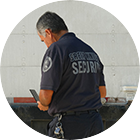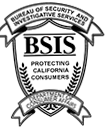Most properties and businesses are more vulnerable at night. As things slow down, the likelihood of security breaches increases, making it essential to hire a security guard. Security personnel working on night shifts face many challenges that could impact their health, performance, and the safety of the properties they safeguard. Knowing the challenges and implementing practical strategies can assist in ensuring your security measures are robust, mainly in sectors that depend on patrol security to deter potential threats and maintain peace of mind.
Challenges of Working on the Night Shift
Some of the common challenges of a security guard working on the night shift include the following:
Increased Crime Rates
Like most urban areas, Los Angeles experiences a significant increase in crimes during the night. These crimes can include petty theft, vandalism, shoplifting, assault, or robbery. The darkness gives criminals anonymity, enabling them to participate in unlawful conduct without detection.
Establishments with minimal staff or those located in isolated regions and poorly lit areas are more vulnerable.
Limited Surveillance and Visibility
Poor lighting around a business can create blindspots that make it effortless for intruders to go unnoticed, increasing the crime risk. Insufficient illumination impairs the security personnel’s ability to monitor your business or home effectively and poses safety threats to the officer.
Moreover, conventional surveillance systems like cameras can struggle to capture clear footage in low-light conditions. This could lead to failure to record vital events or grainy images. The limitations lower the security guard’s effectiveness in monitoring activities and identifying suspects.
Negative Psychological Effects
There is a relationship between mental health and the night shift, with the likelihood of suffering from mental health conditions like mood disorders and depression increasing for people who work at night. It can impact security guards in various ways and manifest as negative thinking, having a short fuse, and anger.
Low performance and productivity due to sleep deprivation can result in your security guard losing their sense of purpose.
The emotional and physical exhaustion can cause emotional detachment and burnout, where the officer becomes more skeptical of their work and less empathetic. The emotional numbness makes it difficult to interact with the general public or tackle conflicts professionally.
Heightened Risk of Suffering from Post-Traumatic Stress Disorder
Although PTSD is commonly related to veterans, your security officer can be at risk, mainly if they are exposed to traumatic and life-threatening occurrences, like fatalities and violent assaults. Guards working in high-risk environments like close protection and cash-in-transits are also vulnerable.
PTSD can manifest in many ways, including anxiety and flashbacks, making it challenging for the security guard to function normally.
Exposure to High-Stress Situations
Typically, security guards find themselves handling difficult people, high-stress situations like emergencies, and remaining vigilant for long hours. This constant state of alertness can result in chronic anxiety and stress.
Poor Work-Life Balance
Security work that involves night shift duties can strain personal relationships, hindering a healthy work-life balance. The unpredictability of the job can make it hard for the security guard to sustain social life and plan family activities.
The poor work-life balance increases the likelihood of developing mental health challenges like depression. A security officer who struggles to find the energy and time to engage in self-care activities might suffer from poor mental wellness.
Loneliness and Isolation
One less-discussed aspect of being a security officer working on the night shift is isolation from being stationed alone for extended durations. Social isolation can affect mental health and make work more monotonous.
Strategies For Managing Potential Night Shift Health Hazards
Please read the section below to learn helpful tips on managing potential health and safety issues from security guards working at night.
Proper Sleep and Schedule Management
Proper sleep planning for night guards reduces potential health risks related to the disruption of circadian rhythms. Having a schedule that permits consecutive night shifts and then a few days off could assist in maintaining a natural sleep cycle.
Security firms should also consider offering informative material and training on nurturing and fostering better sleeping patterns after their night shift, reducing the effects of poor sleep patterns.
There might be light outside after the night security officer finishes their shift. Therefore, advise them to modify their bedroom to manage daylight; sleeping with light entering the room is disturbing. You can urge the night security guard to add blinds or blackout curtains to their bedroom, lock the door, and slit their window to allow air circulation.
Night shifts are more tiresome than the day shift. Security firms should encourage employees to manage their health by practicing good hygiene. Taking a shower shuns away the sleep and fatigue with comfort.
Physical and Nutritional Wellness Measures
Sustaining good physical well-being reduces the severe impacts of night shifts. Security firms can help their guards by offering sound nutritional and dietary advice on coping with night work difficulties, like maintaining their energy levels through balanced meals that prevent potential health hazards.
Daily physical exercises that match the personnel’s shifted “daytime” preserve overall well-being and tackle the lethargy connected to irregular sleep cycles. According to research by Michael I. Reinganum and Janelle Thomas, fitness programs effectively lower the health challenges of shift work.
Like any other person, a security guard should drink water. Water is more vital for physiques that swap sleep patterns. It keeps the guard feeling fresh, attentive, and awake.
While night security officers might be tempted to excessively drink tea, energy drinks, or coffee to stay awake and alert, human bodies can only handle caffeine and keep it effective in less use. Therefore, you should encourage your employees to limit caffeine to one or two cups daily.
Mental Well-Being Support and Resources
Since night shifts could affect your security officer’s mental health significantly, making access to mental health wellness resources and support systems is an essential strategy for managing these risks.
Employers should offer training on identifying symptoms of mental health issues and provide programs that encourage mental wellness, like access to stress and counseling management workshops.
Developing a culture that promotes open discussion regarding mental well-being can help lower stigma, ensuring the security personnel feel supported in tackling any struggles that could arise.
Offer Emergency Response Training
Emergency response training for security personnel equips them with the necessary skills to act promptly and effectively during dangerous situations. Well-trained guards can tell the difference between a controlled and chaotic situation, whether a fire, a potential security breach, or a medical emergency. Professional training enables the security guards to:
- Evaluate individual safely
- Analyze the emergency issue promptly
- Offer emergency first aid before professional help arrives
- Communicate clearly with emergency services
Some of the essential elements during emergency response training include the following:
- Evacuation measures — Guards must understand the building's layout, including evacuation routes and all available exits. The training can cover assisting people living with disabilities, identifying alternative routes/safe exits, coordinating with local emergency service providers, and utilizing evacuation equipment like alarms and fire extinguishers.
- First aid response training equips security guards with the appropriate skills to offer urgent care if an emergency occurs. The training can include an automated external defibrillator, administering cardiopulmonary resuscitation, identifying symptoms of health conditions like heart attacks or strokes, and primary wound care and bandaging.
- Emergency communication — During emergencies, effective communication is vital. Security guards should be well trained to operate radios and other communication pieces of equipment efficiently, keep the management of the property well-informed with rapid updates, offer clear and concise information to fast-response teams, and calmly relay emergency instructions to occupants if an evacuation becomes necessary.
- Situation-based drills — A practical, hands-on approach is vital for emergency response training. Situation-based drills help security guards use their skills in real-life settings when needed. These training drills must simulate different emergencies, including medical emergencies, active shooter scenarios, fire outbreaks, and natural disasters like floods and earthquakes.
Equip Your Night Security Guards with the Suitable Equipment and Tools
The services of security guards are key for maintaining vigilance in different environments at night. Security guards should be well-equipped with proper tools to ensure effective service delivery.
Below is a list of these tools:
- Security uniforms —Uniforms are the most identifiable aspect of the guard’s equipment; they make it easier for individuals to spot the guard if they need help. The uniform also acts as a deterrent to potential criminals while assuring people around their safety. Security clothing consists of visible clothing, bullet-proof vests to offer protection during high-risk scenarios, and heavy-duty boots that provide comfort while protecting their feet as they work long shifts at night.
- Secure communication gadgets — You cannot underestimate the importance of precise and fast communication while providing security services. Guards mostly use mobile phones or two-way radios to contact their colleagues. Earpieces facilitate discreet, fast, and reliable communications and are helpful in noisy surroundings or while conducting covert security operations. The communication gadgets enable the security guards to stay connected around the clock. The officers can also quickly request backups and prevent significant security breaches.
- Flashlights — Flashlights are a must-have for guards, used on night patrols or in dimly lit places. Durable flashlights could also serve as a defensive equipment tool during emergencies. In the case of blackouts, the flashlights enhance visibility.
- Defensive equipment — Since dangerous situations might arise, ensure your security personnel carry non-lethal defensive tools like handcuffs, batons, and pepper spray. Sometimes, the officer might require a firearm, but this involves licensing and specific training.
- Surveillance tools — Your security guard will require surveillance tools like CCTV, digital cameras, and binoculars for effective monitoring. The equipment assists in monitoring suspicious activities and recording evidence.
- Recording tools — While pens, notepads, smartphones, and tablets are basic, they are vital for keeping comprehensive records for legal and reporting purposes. They help your guard maintain a record of every event throughout the night.
Lightning Solutions for Enhanced Safety and Security
Lightning is an effective way to enhance your residential home, industrial site, or commercial building security. Well-planned lighting systems enhance visibility and deter potential criminals.
The first step to solving poor lighting problems is working with an expert to determine areas that need to be improved.
Different forms of lighting solutions include the following:
- Floodlight — A floodlight is wide-angled and exceptionally bright. It is ideal for illuminating a vast outdoor area like a yard, parking lot, or industrial area. You can manually operate these lights or integrate them with motion sensors that allow them to turn on after detecting motion.
- Motion-activated lighting — These lights only turn on when they detect motion. They conserve energy and create an unexpected spotlight to deter potential intruders. You can use them in areas without continuous lighting, driveways, or doorways.
- LED lights — This lighting solution is the most preferred option for many due to its longevity, durability, and efficiency. They come in different colors and brightness levels, making them versatile for various security needs. You can integrate them with smart home systems and motion sensors.
Implementing Organizational and Legal Structures
Security providers should abide by labor laws that govern night shifts. The crucial legal areas include the following:
- Overtime compensation — Compensating night shift employees ensures they receive payment for overtime, as required by law.
- Working hour regulations — You should abide by the lawful limits on the number of hours and breaks an employee should have per shift.
- Health and safety regulations — You should adhere to all health regulations to safeguard your employees from potential risks related to night shift work.
You can also consider implementing effective organizational support structures for your night shift employees. It can consist of the following:
- Health check-ups — You can consider conducting routine health check-ups to monitor and address night shift work's mental and physical health effects.
- Shift rotation guidelines — Following guidelines limiting prolonged night shifts can help mitigate related health hazards.
- Provide access to counseling and wellness programs — Offer programs that promote overall wellness, like fitness membership, mental health services, and nutritional counseling.
Additional Tips For You, the Employer, to Lower the Health Risks Associated With Night Shifts
As an employer, you can explore ways to reduce night shifts' mental and physical health risks by making working shifts safer. Practical safety and health measures include the following:
- Schedule your workers' night shifts accordingly — Generally, the best form of rotating shifts is days, afternoons, and nights. It is easier for the body to gradually adjust to the new work routine instead of doing vice versa. For instance, a schedule involving two day shifts, four night shifts, and a break is more manageable than switching from one month-long dayshift to a new one-month nightshift.
- If possible, allow workers to choose their preferred shift — Employees understand themselves better. The power to choose gives them the flexibility required to meet personal responsibilities. It also provides them with an excellent foundation for their work-life balance.
- Factor in the employees' social and commute — When scheduling shifts, do not just assume that employees require only adequate hours of sleep between their night shifts. You should factor that into your schedule time spent commuting to work. The same applies to social time. Often, security guards cannot catch sleep immediately after arriving home from a night shift, or they may prefer to spend time with their family or friends before napping in preparation for their next shift.
- Provide night security personnel access to healthy foods while working — Most food vendors other than fast-food cafes close at night, reducing the guards’ food options. Therefore, you can provide the guards with nutritious food options during night shifts to encourage good nutrition among employees and healthy dieting.
- Provide socializing opportunities — Shift work may sometimes make it challenging for individuals to develop meaningful friendships with people beyond work parameters. One solution can involve developing friendships with co-workers. As an employer, you can proactively create ways for your employees to familiarize themselves well with each other on and off work, leading to strong social networks. Since colleagues in similar positions might have the same feelings, encouraging them to interact gives them relief and a sense of belonging. Ideas for effective socializing at work include collaborative sports activities, collective volunteering, and company workshops.
- If the night security guard is uncomfortable sharing their feelings with their colleagues, encourage them to join a support group online with people in similar situations.
Find a Skilled Security Services Provider Near Me
Being a security guard working on night shifts comes with challenges beyond physical responsibilities. The psychosocial and psychological demands of the job can take a toll on the officer’s health, mental well-being, and safety. By understanding these challenges and implementing practical solutions, the security officers and employers can mitigate the effects of these challenges. If you want to boost your home’s or business’ security measures, you should hire experienced professionals. Green Knight Security provides comprehensive patrol services, risk assessment, and sophisticated electronic monitoring, ensuring 24/7 protection designed to meet your specific needs. We can work with you to prioritize vital elements like proactive vigilance, emergency response planning, training, thorough site planning, alert security guards, and frequent check-ins to identify and handle your security officers' challenges and guarantee a secure and safe environment. Please contact our Los Angeles office at 844-457-8326 to learn how we can help you.







